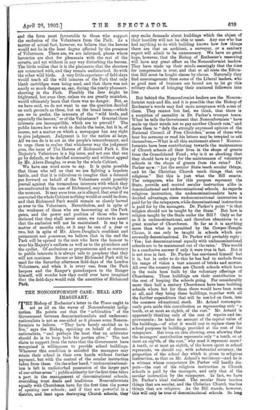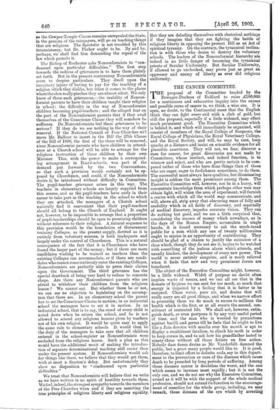THE NONCONFORMIST CASE • REAL AND . IMAGINARY.
THE Bishop of Rochester's letter to the Times ought to act as oil on the waves of Nonconformist indig- nation. He points out that the " arbitration " of the Government between denominationalists and andenomi- nationalists is not so one-sided as it pleases some Noncon- formists to believe. "They have barely enabled us to live," says the Bishop, speaking on behalf of denomi- nationalists, "and perhaps the least that an arbitrator should do is to keep both his parties alive." The test claim to support from the rates that the Government have- recognised is willingness to provide school buildings. Wherever this condition is satisfied the managers may retain their school in their own hands without further payment, but with the control of the secular instruction taken from them. On the other hand," undenominational- ism is left in undisturbed possession of the larger part of our urban areas 7 ; public authority for the first time-takes a Part in the management of denominational schools, overriding trust deeds and traditions. Nonconformists equally with Churchmen have for the first time the power of opening new schools ; and if they are powerful in a district, and bent upon destroying Church schools, they may make demands about buildings which the object of their hostility will not be able to meet. Any one who has had anything to do with building knows how few things there are that an architect, a surveyor, or a sanitary expert will admit to be unnecessary. We have no great hope, however, that the Bishop of Rochester's reasoning will have any great effect on the Nonconformist leaders. They have made up their minds seemingly that the time for compromise is over, and that at all costs the Educa- tion Bill must be fought clause by clause. Naturally they find encouragement from some of the Liberal leaders, who as good men of business are bound not to let go this solitary chance of bringing their scattered followers into line.
But behind the Nonconformist leaders are the Noncon- formist rank-and-file, and it is possible that the Bishop of Rochester's words may find more acceptance with some of them. They cannot but feel, we think, that there is a suspicion of unreality in Dr. Parker's trumpet tones. When he tells the Government that Nonconformists" have made up their minds not to pay another Church rate," and dares them to "defy the strongly expressed opinion of the National Council of Free Churches," some of those who hear his sermons or read his letters may be tempted to ask themselves,—What is all this excitement about ? Noncon- formists have been contributing towards the maintenance of Church schools all their lives in the shape of grants from the Consolidated Fund ; why is it so shocking that they should have to pay for the maintenance of voluntary schools in the shape of grants from the rates ? Dr. Parker says : "Lot the secular State teach secular things, and let the Christian Church teach things that are religious." But this is just what the Bill enacts. The ratepayers, who for this purpose represent the State, provide and control secular instruction alike in denominational and undenominational schools. As regards religious instruction, the undenominationalists have a decided advantage, since undenominational instruction is paid for by the ratepayers, while denominational instruction is paid for by the managers. Dr. Parker's point "is that religion should not be taught by the State." But how is religion taught by the State under the Bill ? Only so far as it is undenominational, and therefore obnoxious to a great number of Churchmen. So far as it is anything more than what is permitted by the Cowper-Temple Clause, it can only be taught in schools which are avowedly denominational. Dr. Parker will probably reply : Yes ; but denominational equally with undenominational schools are to be maintained out of the rates.' This would be a conclusive answer if only it were true in fact. But it is not true in fact. Dr. Parker has convinced himself 'hat it is, but in order to do this he has had to exclude from his range of vision a vast amount of bricks and mortar. All over the country there are Church schools which have in the main been built by the voluntary offerings of Churchmen. These buildings are their contribution to the cost of keeping the schools going. For considerably more than half a century Churchmen have been building schools where but for them there would have been none at all, and they bring these buildings, together with all the further expenditure that will be nee led on them, into the common educational stock. Mr. Acland contemptu- ously puts aside this contribution as representing only " a tenth, or at most an eighth, of the cost.' Mr. Acland is apparently thinking only of the cost of repairs and im- provements; he takes no account of the capital value of the buildings,—of what it would cost to replace them for school purposes by buildings provided at the cost of the ratepayers. But even on this showing, even allowing that . the managers' contribution represents only "a tenth, or at most an eieth, of the cost," why need it represent more ? A tenth, or at most an eighth, of the hours spent in school represents, we should say, with substantial accuracy, the proportion of the school day which is given to religious instruction, so that on Mr. Acland's testimony—and he is a witness whose competence Dr. Parker will hardly dis- pute—the cost of the religious instruction in Church schools is paid by the managers, and only that of the - secular instruction by the ratepayers. In fact, we have Dr. Parker's ideal realised. The secular State teaches things that are secular, and the Christian Church teaches things that are religious. As the Bill stands, however, this will only be true of denominational schools. So long as the Cowper-Temple Clause remains unrepealed the State, in the persons of the ratepayers, will go on teaching things that are religious. The Spectator is not troubled by this inconsistency, but Dr. Parker ought to be. By and by, perhaps, we shall find him demanding the repeal of the law which permits it.
The Bishop of Rochester asks Nonconformists to "con- descend upon particular difficulties." The first step towards the redress of grievances is to have them plainly set forth. But in the present controversy Nonconformists seem to despise particulars. They dwell upon the imaginary injury 6f having to pay for the teaching of a religion which they dislike, but when it comes to the places where the shoe really pinches they are almost silent. We only know of three such grievances,—the inability of Noncon- formist parents to have their children taught their religion in school ; the difficulty in the way of Nonconformist children becoming pupil-teachers ; and the alleged fear on the part of the Nonconformist parents that if they avail themselves of the Conscience Clause they will somehow be sufferers. Do Nonconformists feel these grievances to be serious ? If they do we see nothing in the way of their removal. If the National Council of Free Churches will move Mr. Balfour to insert in the Bill the 27th Clause of the Bill of 1896, the first of the three will be removed, since Nonconformist parents who have children in attend- ance at a Church school will be able to arrange for the religious instruction of these children by their own Minister. This, with the power to make a correspond- ing arrangement in Board-schools, was part of the demand put forward by the two Convocations, so that such a provision would certainly not be op- posed by Churchmen, and could, if the Nonconformists desire it, be introduced without difficulty in Committee. The pupil-teacher grievance arises in this way. The teachers in elementary schools are largely supplied from this source, and as the pupil-teachers have early in their career to take part in the teaching in the school to which they are attached, the managers of a Church school naturally find it convenient that their pupil-teachers should all belong to the Church of England. It ought not, however, to be impossible to arrange that a proportion of pupil-teacherships should be open to promising children without reference to their religion. A natural sequence to this provision would be the foundation of Government training Colleges, as the present supply, derived as it is entirely from voluntary sources, is both inadequate and largely under the control of Churchmen. This is a natural consequence of the fact that it is Churchmen who have found the larger part of the money; but if there are more candidates wishing to be trained as teachers than the existing Colleges can accommodate, or if there are candi- dates who cannot conscientiously enter the existing Colleges, Nonconformists are perfectly able to press their claims upon the Government. The third grievance has the special drawback of being very hard to reduce to concrete shape. Are there any Nonconformist parents who are afraid to withdraw their children from the religious lesson ? We cannot say. But whether there be or not, we can see no objection to legislating on the assump- tion that there are. In an elementary school the parent has to set the Conscience Clause in motion; in an industrial school the managers have to set it in motion. In an industrial school, that is to say, the creed of every child is noted down when he enters the school, and he is not allowed to attend any religious lessons given by teachers not of his own religion. It would be quite easy to apply the same rule to elementary schools. It would then be the duty of the managers to take care that all children entered in the school-register as Nonconformists were excluded from the religious lesson. Such a plan as this would have the additional merit of making the introduc- tion of separate denominational teaching still easier than under the present system. If Nonconformists would ask for things like these, we believe that they would get them, with at most a Session's delay. But unfortunately they show no disposition to "condescend upon particular difficulties."
We trust that Nonconformists will believe that we write as we have written in no spirit of hostility towards them. We feel, indeed, the strongest sympathy towards the members of the Free Churches when and if they are asserting the true principles of religious liberty and religious equality. But they are deluding themselves with rhetorical nothings if they imagine that they are fighting the battle of religious liberty in opposing the present Bill as an Act of spiritual tyranny. On the contrary, the tyrannical inclina- tion is with those who desire to destroy the voluntary schools. The leaders of the Nonconformist hierarchy are indeed in no little danger of becoming the tyrannical priests of Secular Uniformity. But Secular Uniformity, if allowed to go unchecked, may prove just as great an oppressor and enemy of liberty as ever did religious uniformity.



























































 Previous page
Previous page